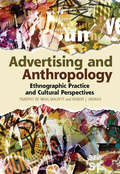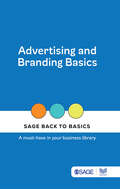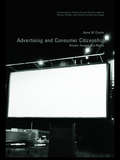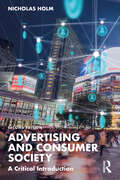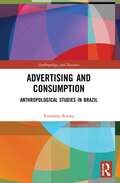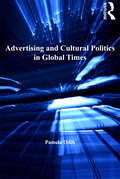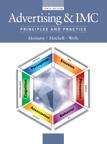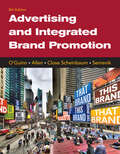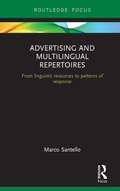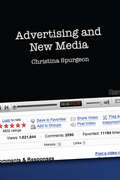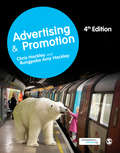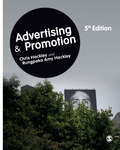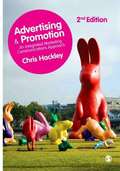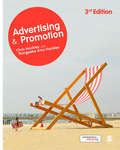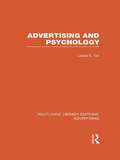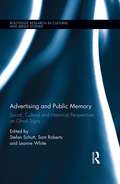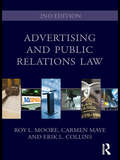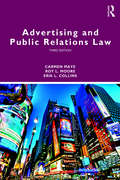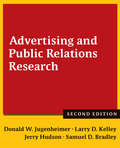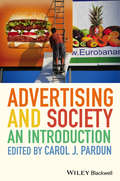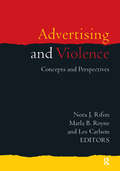- Table View
- List View
Advertising and Anthropology: Ethnographic Practice and Cultural Perspectives
by Robert J. Morais Timothy de Waal MalefytExamining theory and practice, Advertising and Anthropology is a lively and important contribution to the study of organizational culture, consumption practices, marketing to consumers and the production of creativity in corporate settings. The chapters reflect the authors' extensive lived experienced as professionals in the advertising business and marketing research industry. Essays analyze internal agency and client meetings, competitive pressures and professional relationships and include multiple case studies. The authors describe the structure, function and process of advertising agency work, the mediation and formation of creativity, the centrality of human interactions in agency work, the production of consumer insights and industry ethics. Throughout the book, the authors offer concrete advice for practitioners.Advertising and Anthropology is written by anthropologists for anthropologists as well as students and scholars interested in advertising and related industries such as marketing, marketing research and design.
Advertising and Branding Basics (SAGE Back to Basics)
by SAGE Publications India Pvt. LtdFrom the experts who have witnessed the highs and lows of various brands, Advertising and Branding Basics offers valuable insights on brand building in today’s consumer-centric world. As millennials continue to grapple with bottlenecks such as brand malfunctioning and bad customer reviews, the book provides a holistic review of the industry and why some brands survive the competition and others cease to exist. The book will draw the interest of advertising and branding professionals and new age leaders looking for one-stop advice on the subject. SAGE Back to Basics is a distilled compilation of proven and timeless ideas and best practices for new-age and experienced leaders alike. The hand-picked collection of books—on management, leadership, entrepreneurship, branding and CSR—offer advice from management experts whose knowledge and research has impacted and shaped business and management education. Other books in the series: Timeless Leadership | Leadership Lessons from Dr Pritam Singh | Corporate Social Responsibility in India | Basics of Entrepreneurship | Human Resource Development Insights | Ideate, Brainstorm, Create | Building Professional Competencies | Timeless Management | Soft Skills for Workplace Success
Advertising and Consumer Citizenship: Gender, Images and Rights (Transformations)
by Anne M. CroninUsing a variety of print advertisements, this exciting and provocative study explores how the consumer is created by advertisements in terms of:* Sex* Class* Race.It also explores the figure of the citizen and how this identity is produced by contemporary political discourses. Advertising and Consumer Citizenship will be essential reading for all those interested in the study of consumption, citizenship and gender.
Advertising and Consumer Society: A Critical Introduction
by Nicholas HolmThis critical introductory text explores the role of advertising in contemporary culture and its connections to larger economic, social, and political forces. Written in an engaging and accessible style and incorporating a wide range of examples from around the world, the chapters introduce the key concepts, methods, and debates needed to analyse and understand advertising. From an investigation of advertising’s crucial function in media economics and our wider capitalist system to a consideration of the people who both make and watch advertising, this insightful text enables students to: make sense of advertising’s powerful influence as both an economic force and an artistic form; assess the various claims of these two perspectives on advertising; and understand how they challenge and complicate one another. This revised second edition includes a new chapter on branding and promotional culture, and substantially updated content on topics like digital and online advertising, surveillance and empowerment, as well as brand new topics like self-branding/influencers and using technology to evade advertising. Equipping students with the skills needed to partake in this lively discourse, the text is an invaluable resource for studying advertising critically. It is essential reading for students of advertising, media studies and communication studies.
Advertising and Consumption: Anthropological Studies in Brazil (Anthropology and Business)
by Everardo RochaThis book argues for the study of consumption and its relationship with media images, particularly advertising, from a cultural perspective. Focused on Brazil, it draws on decades of research by the author and engages with theory and concepts from a range of classic anthropological works. The chapters examine how advertising professionals view their craft, the resistance to capitalism amongst native Brazilians, images of women and their bodies in magazines, and the case of the first soccer player to become a national media celebrity. Rocha supports the study of consumption as a classification system that materializes culture and creates relations between people and goods. The book presents advertising as a mode of magical thinking that mediates the passage from the machine-driven sphere of production to the humanized sphere of consumption, converting meaningless impersonal things into goods that have name, origin, identity and purpose. It will be of interest to anthropologists, sociologists and others working on advertising, marketing, communications, and consumer research.
Advertising and Cultural Politics in Global Times
by Pamela OdihAdvertising and Cultural Politics in Global Times traces daringly transgressive convergences between cultural politics and global advertising media. It engages with a range of interpolations between cultural politics and advertising technologies including: the governmental rationality of neoliberal vistas, transgressive aesthetics and the cultural politics of representation, the political sign-economy of citizen branding, techno-political convergences between the social and political, and the marking of a new exciting geo-political terrain for cultural politics in global times. Tracing global advertising practices to the cultural politics commonly manifested in the postmodern political caesura of advertising, this book makes use of extensive case studies, whilst drawing on the work of Baudrillard, Giroux, Foucault, Castells and Latour to illustrate the manner in which advertising continues to revolutionize the political sphere. As such, it will be of interest to a range of readers across media studies, cultural studies and sociology.
Advertising and IMC: Principles and Practice (Tenth Edition)
by Nancy Mitchell Sandra Moriarty William D. WellsAdvertising tracks the changes in today’s dynamic world of media and marketing communication–as well as the implications of these changes to traditional practice–and presents them to students through an accessible, well-written approach. The Tenth edition highlights the increasing importance of consumers as the driving force in today’s advertising strategies, social media, and the Internet evolution/revolution. It also includes an increased IMC and brand focus.
Advertising and Integrated Brand Promotion
by Richard J. Semenik Angeline Close Scheinbaum Chris T. Allen Thomas Clayton O'GuinnToday's most contemporary ads and exhibits combine with coverage of the latest practices and industry developments, including social media, design thinking, and an emphasis on globalization. The book's focus on real advertising practice is reflected in the book's contents that follows the same process as an advertising agency. Trust ADVERTISING AND INTEGRATED BRAND PROMOTION, 7E to equip you with the tools, knowledge, and practice to get results in advertising and business today.
Advertising and Integrated Brand Promotion
by Angeline Close Scheinbaum Chris T. Allen Thomas Clayton O’Guinn Semenik Richard J.Show students how hard work and careful planning lead to strong advertising with O’Guinn/Allen/Close Scheinbaum/Semenik's ADVERTISING AND INTEGRATED BRAND PROMOTION, 8E. Bring advertising strategy to life with dynamic visuals and examples from today's most contemporary ads. This integrated learning experience focuses on advertising results and business success. A leader for its emphasis on integrated brand promotion and supporting theme of synergy, this edition combines advertising fundamentals with a new unifying conceptual framework and the latest advertising trends. Coverage of social media, design thinking, and globalization exemplifies developments in today's digital society. Students examine concepts in the context of real advertising practice as content follows the process of an actual advertising agency. Comprehensive MindTap integrates discussion of video and other medium.
Advertising and Multilingual Repertoires: from Linguistic Resources to Patterns of Response (Routledge Focus on Linguistics)
by Marco SantelloAdvertising and Multilingual Repertoires explores advertising from the perspective of multilingual audiences. Santello introduces the key linguistic processes involved in advertising discourse, and analyses the relationship between the linguistic repertoires of audiences and language use in advertising. This book: Showcases the most recent advancements in linguistic research as applied to the study of advertising and multilingualism, adopting an approach that focuses on linguistic resources; Examines how advertisements make use of language(s), including Italian and the use of English as a foreign language, in order to attract attention and persuade their audience; Familiarises readers with response mechanisms that bilinguals and multilinguals experience when exposed to advertising in different languages; Demonstrates both qualitative and quantitative approaches to researching the intersections between language and marketing. Advertising and Multilingual Repertoires is key reading for postgraduate students and researchers in the field of language and advertising.
Advertising and New Media
by Christina SpurgeonThis comprehensive introduction explores the evolving relationship between new media, advertising and new media consumers. Tracing the shift from 'mass' to 'my' media, Advertising and New Media critically evaluates the social and cultural implications of increased interactivity and consumer creativity for the future of advertising, with examples drawn from the USA, the UK, Europe, Australia and the peoples Republic of China.Features include: evaluation of consumer-generated advertising, including the Coke Mentos phenomenon, and comparative analysis of the Dove ‘Real Beauty’ and Axe/Lynx ‘Effect’ campaigns interviews with industry practitioners, providing first-hand insights on the impact of new media on advertising.
Advertising and Promotion
by Chris Hackley Dr Rungpaka Amy HackleyUsing a wide range of visual examples and case studies, Advertising and Promotion 4th edition introduces the reader to the key concepts, methods and issues and illustrates these with first-hand examples gathered from leading international advertising agencies and brand campaigns. Told from the perspective of the agency, it gives a fun and creative insider view helping the reader to think beyond the client position and understand what it might be like working within an ad agency. Drawing not only from management and marketing research but also from other disciplines such as cultural/media studies and sociology, the authors offer a rounded and critical perspective on the subject to those looking to understand advertising as social phenomenon in addition to its business function and purpose. The new edition has in-depth coverage of online advertising and the role of social media in advertising including metrics and analytics and includes advertising examples by global brands including Adidas, Benetton, BMW, Dove and DeBeers. “Snapshots” bring in aspects of cross-cultural advertising such as Barbie in China. The book is complemented by a companion website featuring a range of tools and resources for lecturers and students, including PowerPoint slides, an instructor’s manual, SAGE journal articles, links to further online resources and author Videos. The textbook is also supported by an author-written blog which keeps readers updated on interesting, topical examples relating to advertising and promotion from current affairs and popular culture: www.hackleyadvertisingandpromotion.blogspot.com. Suitable for Advertising, Marketing and Communications modules at undergraduate or postgraduate level.
Advertising and Promotion
by Chris Hackley Rungpaka Amy HackleyNow in its fifth edition, this popular textbook continues to provide students with a comprehensive insight into the world of advertising and promotional communications. Unique in its approach, the authors situate the key concepts of marketing communications from the perspective of advertising agencies and provide insight into what a career within an ad agency might be like. Their critical approach grounded in up-to-date research allows the reader to develop an interdisciplinary understanding of marketing and advertising, including business, socio-cultural, media studies and consumer culture theory perspectives. Along with striking full colour visual advertisements and illustrations, new examples and case studies, this fifth edition has been fully updated to include: Two brand new chapters on Social Media Advertising and Digital Advertising Commentary on how the COVID-19 pandemic has and will impact advertising The evolving role of advertising agencies in the post digital era Emerging forms of advertising and promotion, including the role of influencers
Advertising and Promotion
by Chris Hackley Dr Rungpaka Amy HackleyUsing a wide range of visual examples and case studies, Advertising and Promotion 4th edition introduces the reader to the key concepts, methods and issues and illustrates these with first-hand examples gathered from leading international advertising agencies and brand campaigns. Told from the perspective of the agency, it gives a fun and creative insider view helping the reader to think beyond the client position and understand what it might be like working within an ad agency. Drawing not only from management and marketing research but also from other disciplines such as cultural/media studies and sociology, the authors offer a rounded and critical perspective on the subject to those looking to understand advertising as social phenomenon in addition to its business function and purpose. The new edition has in-depth coverage of online advertising and the role of social media in advertising including metrics and analytics and includes advertising examples by global brands including Adidas, Benetton, BMW, Dove and DeBeers. “Snapshots” bring in aspects of cross-cultural advertising such as Barbie in China. The book is complemented by a companion website featuring a range of tools and resources for lecturers and students, including PowerPoint slides, an instructor’s manual, SAGE journal articles, links to further online resources and author Videos. The textbook is also supported by an author-written blog which keeps readers updated on interesting, topical examples relating to advertising and promotion from current affairs and popular culture: www.hackleyadvertisingandpromotion.blogspot.com. Suitable for Advertising, Marketing and Communications modules at undergraduate or postgraduate level.
Advertising and Promotion
by Chris Hackley Rungpaka Amy HackleyNow in its fifth edition, this popular textbook continues to provide a comprehensive insight into the world of advertising and promotional communications. Unique in its approach, the authors situate the key concepts of marketing communications from the perspective of advertising agencies and provide insight into what a career within an ad agency might be like. Their critical approach grounded in up-to-date research allows the reader to develop an interdisciplinary understanding of marketing and advertising, including business, socio-cultural, media studies and consumer culture theory perspectives. Along with striking full colour visual advertisements and illustrations, new examples and case studies, this fifth edition has been fully updated to include: Two brand new chapters on Social Media Advertising and Digital Advertising Commentary on how the COVID-19 pandemic has and will impact advertising The evolving role of advertising agencies in the post digital era Emerging forms of advertising and promotion, including the role of influencers
Advertising and Promotion
by Chris Hackley Rungpaka Amy HackleyNow in its fifth edition, this popular textbook continues to provide a comprehensive insight into the world of advertising and promotional communications. Unique in its approach, the authors situate the key concepts of marketing communications from the perspective of advertising agencies and provide insight into what a career within an ad agency might be like. Their critical approach grounded in up-to-date research allows the reader to develop an interdisciplinary understanding of marketing and advertising, including business, socio-cultural, media studies and consumer culture theory perspectives. Along with striking full colour visual advertisements and illustrations, new examples and case studies, this fifth edition has been fully updated to include: Two brand new chapters on Social Media Advertising and Digital Advertising Commentary on how the COVID-19 pandemic has and will impact advertising The evolving role of advertising agencies in the post digital era Emerging forms of advertising and promotion, including the role of influencers
Advertising and Promotion
by Dr Chris Hackley'Bridges the academic gap between textbook and leading edge marketing thinking. It has been substantially revised and is particularly strong on electronic media and their current marketing usage' - Ros Masterson, De Montfort University, Leicester, UK 'Lucid, insightful, an inspiration for even more creative communications and a treat for the mind. A must read for all wanting to better understand advertising and promotions' - Leslie de Chernatony Professor of Brand Marketing, Università della Svizzera Italiana, Lugano, Switzerland and Aston Business School, UK The eagerly-awaited Second Edition of Advertising and Promotion continues to provide a highly readable and authoritative introduction to the key concepts and issues for the study of advertising and promotional communication in a global context. NEW to this edition: - A stronger focus on integrated marketing communications and the promotional mix, including PR and personal selling. - Expanded coverage of contemporary topics, including: integrating e-marketing, Web 2.0, mobile advertising, sponsorship, branding, direct marketing, ethics, and social responsibility and regulation. - A focus on the implications for advertising of the continuing changes in the media infrastructure and the new media funding models emerging as a result. - A companion website including a full instructors' manual for lecturers, including PowerPoint slides and extra case studies, and access to full-text journal articles for students (www.sagepub.co.uk/hackley) Packed with case studies and first-hand examples gathered from leading international advertising agencies, Chris Hackley succeeds in providing a lively and stimulating guide to the rapidly evolving advertising environment.
Advertising and Promotion
by Dr Chris Hackley Dr Rungpaka Amy HackleyThis textbook introduces the key concepts, methods and issues within advertising and promotion for students taking courses on the subject at universities and colleges. It offers first-hand examples gathered from leading international advertising agencies and brand campaigns, and it is told from the perspective of the agency to give a fun and creative insider view which helps the reader to think beyond the client position and understand what it might be like working within an ad agency. The authors draw not only from management and marketing research but also from other disciplines such as cultural/media studies and sociology to offer a rounded and critical perspective on the subject for those looking to achieve high grades and understand advertising as social phenomenon in addition to its business function and purpose. New to the third edition: chapter on strategy and creativity additional case studies with increased global coverage including emerging markets images of classic and recent ads from the street, print, online and television increased coverage of the internet, social media and their effects on advertising companion website materials including relevant videos, journal articles and a Jeopardy-style game for the classroom The textbook is now also supported by a new author-written blog which keeps readers updated on interesting, topical examples relating to advertising and promotion from current affairs and popular culture: www.hackleyadvertisingandpromotion.blogspot.com.
Advertising and Psychology (Routledge Library Editions: Advertising)
by Leslie Ernest GillThe consequences of advertising on the social life of the community has been a much-discussed topic in recent years. Advertising as a means of influencing the thought and behaviour of masses of people involves the application of such fundamental aspects of psychology as attention, motivation, memory, association, suggestion, volition, and so on. Modern advertising presents its message in a variety of forms: attracting, informing, reminding, suggesting and impelling us many times during the course of any single day. To what extent advertising influences our tastes, preferences and purchases may be gauged by the number of things we buy directly or indirectly as the result of reading advertisements. In this volume the main interest is the study of public reaction to various advertising appeals. The advertising aspect of psychology involves the study of man’s conscious and near-conscious activities. What goes on his mind when he is attracted by something he sees and reads in an advertisement or poster? This question Advertising and Psychology attempts to answer. Dealing as it does with so complex and fascinating a theme, this book’s purpose is to provide an introductory outline in a manner intelligible to both the student and the general reader. First published in 1954.
Advertising and Public Memory: Social, Cultural and Historical Perspectives on Ghost Signs (Routledge Research in Cultural and Media Studies)
by Sam Roberts Leanne White Stefan SchuttThis is the first scholarly collection to examine the social and cultural aspects on the worldwide interest in the faded remains of advertising signage (popularly known as ‘ghost signs’). Contributors to this volume examine the complex relationships between the signs and those who commissioned them, painted them, viewed them and view them today. Topics covered include cultural memory, urban change, modernity and belonging, local history and place-making, the crowd-sourced use of online mobile and social media to document and share digital artefacts, ‘retro’ design and the resurgence in interest in the handmade. The book is international and interdisciplinary, combining academic analysis and critical input from practitioners and researchers in areas such as cultural studies, destination marketing, heritage advertising, design, social history and commercial archaeology.
Advertising and Public Relations Law
by Roy L. Moore Carmen Maye Erik L. CollinsAddressing a critical need, Advertising and Public Relations Law explores the issues and ideas that affect the regulation of advertising and public relations speech. Coverage includes the categorization of different kinds of speech afforded varying levels of First Amendment protection; court-created tests for laws and regulations of speech; and non content-based restrictions on speech and expression. Features of this second edition include: overviews and synopses for each chapter extended excerpts from major court decisions appendices providing a chart of the judicial system, a summary of the judicial process, an overview of alternative dispute resolution mechanisms, and the professional codes for media industry and business associations online materials for instructors. The volume is intended for upper-level undergraduate and graduate students in media, advertising and public relations law or regulation courses. It also serves as an essential reference for advertising and public relations practitioners.
Advertising and Public Relations Law (Routledge Communication Series)
by Roy L. Moore Carmen Maye Erik L. CollinsAddressing a critical need, Advertising and Public Relations Law explores the issues and ideas that affect the regulation of advertising and public relations speech, some of the most dynamic and prevalent areas of professional communications today. This updated third edition explores the categorization of different kinds of speech and their varying levels of First Amendment protection as well as common areas of litigation for communicators such as defamation, invasion of privacy, and copyright and trademark infringement. Features of this edition include: A new chapter on Internet-related laws affecting advertising and public relations speech. History and background of major legal theories affecting professional communicators. Extended excerpts from major court decisions. Overviews of relevant federal and state regulatory schemes, including those promulgated and enforced by the FTC, FCC, FDA and others. Appendices providing a legal glossary, a chart of the judicial system, sample model releases and copyright agreement forms. The volume is developed for upper-level undergraduate and graduate students in media, advertising and public relations law or regulation courses. It also serves as an essential reference for advertising and public relations practitioners.
Advertising and Public Relations Research
by Donald W. Jugenheimer Larry D. Kelley Jerry Hudson Samuel BradleyDesigned to serve as a comprehensive, primary text for research methods courses in advertising and/or public relations programs, this book concentrates on the uses and applications of research in advertising and public relations situations. The authors' goal is to provide the information needed by future practitioners to commission and apply research to their work problems in advertising and public relations.
Advertising and Society: An Introduction
by Carol J. PardunNow revised and updated to reflect the impact of emerging technologies, this new edition of Advertising and Society: Controversies and Consequences examines the evolution of advertising and its influence on society. Expanded with five new chapters covering the impact of emerging technologies, including the evolution of Direct to Consumer (DTC) pharmaceutical advertising; product placement in various media; and the growing intrusiveness of Internet marketing Explores a broad range of topics including alcohol, tobacco, and sex in advertising; the pros and cons of negative political adverts; advergrames; and the use of stereotypes Examines the impact of advertising through its distinctive ‘point/counterpoint’ format –designed to spark discussion and help students understand the complexities of the issues being presented Lends substantial clarity to the subject, uniquely balancing criticism and practice within one text Includes chapter-level overviews and summaries of the topic history and key issues, along with student-friendly features such as ideas for papers and questions for discussion
Advertising and Violence: Concepts and Perspectives
by Nora J. Rifon Marla B Royne Les CarlsonAdvertising and Violence identifies and analyzes the important issues related to violence in advertising and its overall effects on society. The book is based on a widely cited special issue of the Journal of Advertising and includes eight new chapters that expand the book's coverage.The objective of the book is to compile a compendium of current thinking, perspectives, theoretical viewpoints, and research relevant to the violence and advertising interface. The chapter authors, all notable experts in the field, take a multidisciplinary approach that incorporates perspectives from disciplines other than marketing in order to provide a broad-based view of how advertising and violence coalesce and the policy implications of this juxtaposition.
